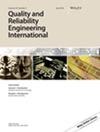Assessing high‐quality process performance using the quality‐yield index: An innovative methodology
IF 2.8
3区 工程技术
Q3 ENGINEERING, INDUSTRIAL
引用次数: 0
Abstract
Manufacturers must meet high‐quality standards and exceed customer expectations to stay competitive due to significant technological advancements in recent decades. While implementing the yield measure is useful for achieving process performance by focusing on products that fall within specified limits, it does not accommodate specific customer requirements, particularly when a product's quality characteristic deviates from target value. To address this need, the quality‐yield index (Q‐yield) has been proposed, which combines the process‐yield index and loss‐based capability index, providing a more advanced performance measure. However, the Q‐yield index's confidence interval is challenging to derive due to the complicated sampling distribution involved. Several existing methods have attempted to construct an approximate confidence interval but none have performed well. Therefore, this article proposes an innovative approach, called the generalized confidence intervals (GCIs), that utilizes the idea of generalized pivotal quantities to establish the confidence interval for the Q‐yield index. The proposed approach is evaluated through simulations and compared to existing methods. The results reveal that the proposed approach provides the most accurate results for constructing the lower confidence bound of the Q‐yield index. This approach is recommended to evaluate process performance using the Q‐yield index for high‐quality customer requirements.使用质量收益指数评估高质量工艺性能:创新方法
由于近几十年来技术的长足进步,制造商必须达到高质量标准并超越客户期望才能保持竞争力。虽然实施产量衡量标准有助于通过关注在规定范围内的产品来实现过程绩效,但它并不能满足客户的具体要求,尤其是当产品的质量特性偏离目标值时。为了满足这一需求,有人提出了质量产量指数(Q-yield),它结合了流程产量指数和基于损耗的能力指数,提供了一种更先进的性能测量方法。然而,由于涉及复杂的抽样分布,Q-产量指数的置信区间的推导具有挑战性。现有的几种方法都试图构建近似的置信区间,但效果都不理想。因此,本文提出了一种称为广义置信区间(GCIs)的创新方法,利用广义枢轴量的思想来建立 Q-产量指数的置信区间。我们通过模拟对所提出的方法进行了评估,并与现有方法进行了比较。结果表明,建议的方法为构建 Q-产量指数的置信区间下限提供了最准确的结果。建议使用这种方法利用 Q-产量指数评估流程性能,以满足高质量的客户要求。
本文章由计算机程序翻译,如有差异,请以英文原文为准。
求助全文
约1分钟内获得全文
求助全文
来源期刊
CiteScore
4.90
自引率
21.70%
发文量
181
审稿时长
6 months
期刊介绍:
Quality and Reliability Engineering International is a journal devoted to practical engineering aspects of quality and reliability. A refereed technical journal published eight times per year, it covers the development and practical application of existing theoretical methods, research and industrial practices. Articles in the journal will be concerned with case studies, tutorial-type reviews and also with applications of new or well-known theory to the solution of actual quality and reliability problems in engineering.
Papers describing the use of mathematical and statistical tools to solve real life industrial problems are encouraged, provided that the emphasis is placed on practical applications and demonstrated case studies.
The scope of the journal is intended to include components, physics of failure, equipment and systems from the fields of electronic, electrical, mechanical and systems engineering. The areas of communications, aerospace, automotive, railways, shipboard equipment, control engineering and consumer products are all covered by the journal.
Quality and reliability of hardware as well as software are covered. Papers on software engineering and its impact on product quality and reliability are encouraged. The journal will also cover the management of quality and reliability in the engineering industry.
Special issues on a variety of key topics are published every year and contribute to the enhancement of Quality and Reliability Engineering International as a major reference in its field.

 求助内容:
求助内容: 应助结果提醒方式:
应助结果提醒方式:


